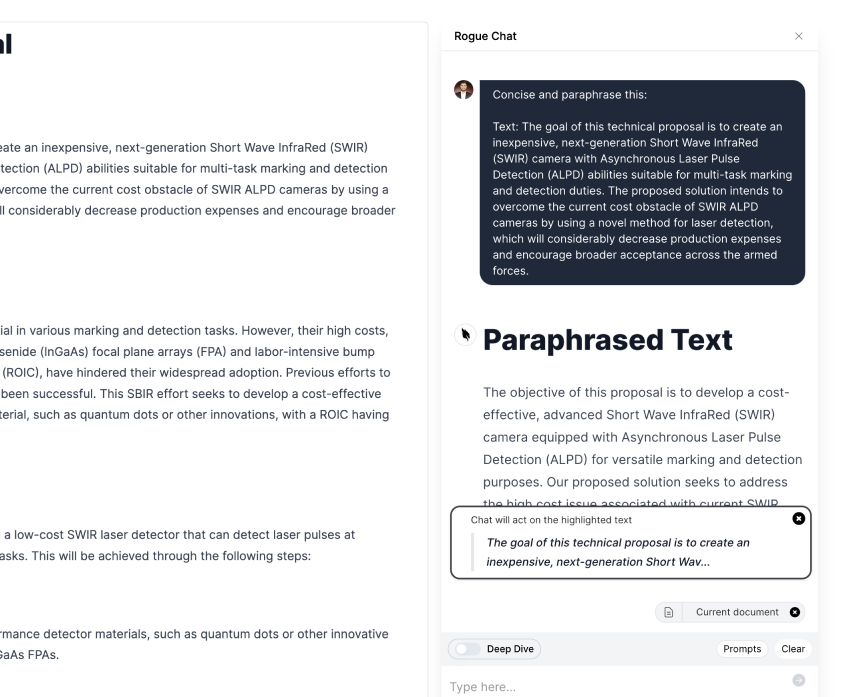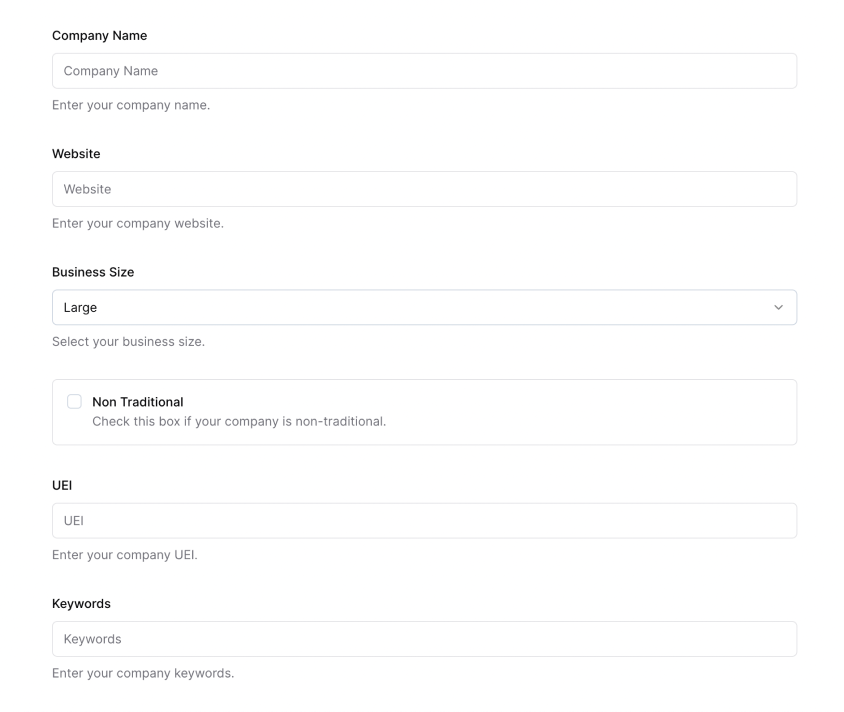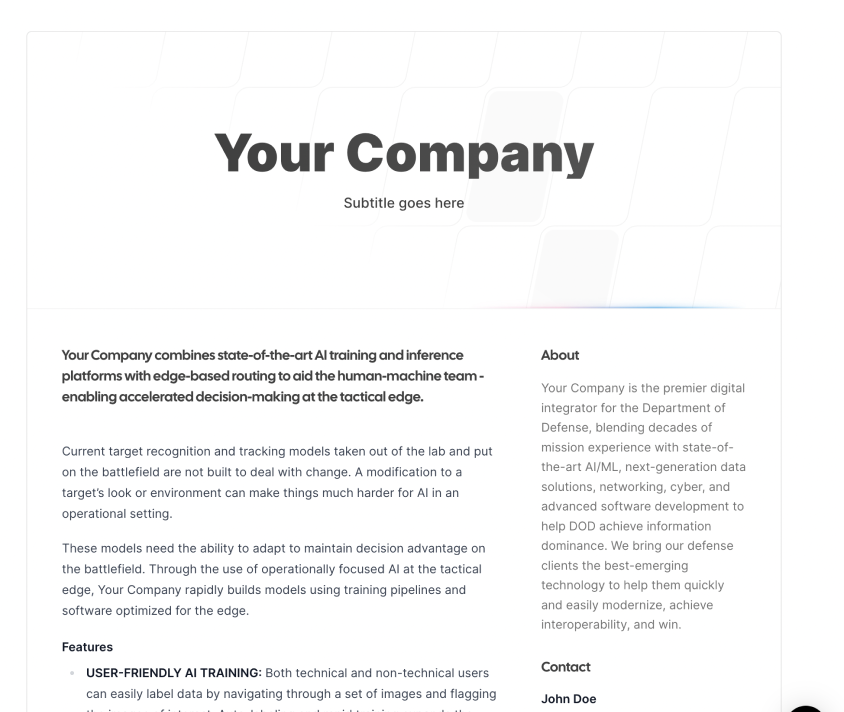
A Comprehensive Guide to E.O. 13985 and Incorporating DEI into Government Contract Proposals
A Comprehensive Guide to E.O. 13985 and Incorporating DEI into Government Contract Proposals
Table of contents
- I. Executive Order 13985
- II. Understanding DEI
- III. Incorporating DEI into Government Contract Proposals
- A. Understanding the Importance of Diversity, Equity, and Inclusion in Government Proposals
- B. Best Practices for Incorporating DEI in Government Proposals
- C. Creating a DEI Strategy for Your Government Proposal
- D. Addressing Systemic Barriers in Government Proposals
- E. Showcasing Your Organization's Commitment to DEI in Your Government Proposal
- Final Thoughts
In recent years, the importance of diversity, equity, and inclusion (DEI) has become increasingly apparent across various sectors, including government contracting. With the introduction of Executive Order (E.O.) 13985, federal agencies and contractors must now incorporate DEI into their contract solicitations and proposals. While DEI is still in the process of being incorporated, it is important to educate yourself. In this article we will provide a comprehensive overview of E.O. 13985, discuss the importance of DEI in government contracting, and outline how to start incorporating DEI into your government contract proposals.
I. Executive Order 13985
A. Background and Purpose
On January 20, 2021, President Joe Biden signed E.O. 13985 titled "Advancing Racial Equity and Support for Underserved Communities Through the Federal Government". This order was designed to promote diversity, equity, and inclusion (DEI) across all aspects of federal government operations. In stark contrast to its predecessor, E.O. 13950 - which restricted certain types of diversity training for federal employees and contractors - this new order represents a significant shift in approach towards DEI initiatives at the highest levels of government.
The purpose behind E.O. 13985 is to ensure that underserved communities are not left behind in federal programs and policies due to systemic racism or other forms of discrimination. The Biden administration believes that promoting racial equity will lead to greater economic prosperity for all Americans by opening doors for historically marginalized groups who have been excluded from opportunities in the past.
In practical terms, E.O. 13985 requires each agency head within the federal government to assess how their respective agencies can best advance equity through their policies and programs while also identifying any barriers that may prevent them from doing so effectively. Furthermore, it establishes an inter-agency council on advancing racial equity whose task is to coordinate efforts among various departments and agencies working towards this common goal.
B. Key Components
E.O. 13985 establishes several key components aimed at advancing equity in the federal government:
- Establishment of an interagency working group on equity: This working group is tasked with providing recommendations on how the federal government can better address equity issues and promote equal opportunity for all Americans.
- Development of a "whole-of-government" approach to advancing equity: This approach requires federal agencies to review their policies and programs to identify barriers to equal opportunity and develop strategies to address these barriers.
- Role of OMB in coordinating efforts: The Office of Management and Budget (OMB) plays a crucial role in coordinating efforts across federal agencies to implement the order's requirements.
C. Implications for Federal Government Contracting
For federal government workers involved in contract proposals, E.O. 13985 has several implications:
- Review of procurement processes: Federal agencies must review their procurement processes to ensure they are promoting DEI in contracting opportunities. DEI will be an evaluation factor in coming solicitations, so industry must articulate their approach to DEI, and government must in turn evaluate those approaches.
- Ensuring DEI in contracting opportunities:
In order to promote diversity, equity, and inclusion (DEI) within government contracting, federal agencies are required to take active measures to ensure that opportunities for contract bidding are available and accessible to a wide range of businesses. This includes prioritizing small and disadvantaged businesses that may otherwise struggle to compete with larger corporations on their own. By expanding the pool of potential contractors, the government can increase competition in the marketplace while also promoting economic growth in underserved communities.
To achieve these goals, agencies must develop clear policies and procedures for identifying diverse businesses eligible for federal contracts. They should establish outreach programs designed specifically to engage small and minority-owned businesses, offering support such as technical assistance or mentorship programs to help them navigate complex procurement processes. Additionally, agencies may set aside a percentage of their contracts exclusively for diverse firms or require prime contractors on large projects to subcontract portions of the work out to smaller firms.
By taking steps like these, federal agencies can make significant strides towards improving DEI within government contracting while also strengthening local economies across the country.
II. Understanding DEI
A. Definition of Diversity, Equity, and Inclusion
To effectively incorporate DEI into government contract proposals, it is essential to understand the meaning of each term:
- Diversity: refers to the recognition and celebration of differences among individuals in terms of their backgrounds, experiences, identities, and perspectives. This includes but is not limited to race, ethnicity, gender identity or expression, age range, sexual orientation or preference, religious beliefs or practices as well as socioeconomic status. Diversity recognizes that each individual brings a unique set of characteristics and attributes that shape their worldview and how they interact with others around them. Embracing diversity enables people to work together towards common goals while valuing each other's contributions equally regardless of these differences. By cultivating diverse teams within organizations can help foster innovation by bringing together varied viewpoints that challenge conventional thinking thus promoting growth for all involved parties leading ultimately to enhanced success at every level from personal development through business operations up until national economic prosperity.
- Equity: is a critical component of Diversity, Equity, and Inclusion efforts. It refers to the notion of ensuring equitable access to opportunities for all individuals regardless of their backgrounds. Equity aims to address systemic barriers and biases that have historically prevented certain groups from accessing essential resources or achieving success in various aspects of life. By promoting equity in workplaces, schools, communities, and other settings, we can create more inclusive environments where everyone has a fair chance to succeed.
Achieving equity requires identifying and addressing disparities that exist across different demographic groups such as race/ethnicity, gender identity/expression, sexual orientation, socio-economic status (SES), ability/disability status etc. For instance, if women are underrepresented in leadership positions within an organization or industry despite accounting for a significant portion of the workforce at lower levels- this indicates that there could be systemic barriers hindering their advancement opportunities.
To promote equity effectively requires intentional action by employers or organizations seeking government contracts; these actions may include targeted recruitment strategies aimed at attracting diverse talent pools; providing training programs that acknowledge and address unconscious bias among employees; implementing policies/practices that explicitly prohibit discrimination based on protected characteristics such as race/ethnicity/gender etc.; establishing mentorship/sponsorship programs tailored towards supporting underrepresented employees' professional development paths; amongst others.
It must be noted that equity is not synonymous with equality - which implies treating all people the same way irrespective of differences in needs/circumstances. Rather than focusing solely on providing identical
- Inclusion: is an integral part of Diversity, Equity, and Inclusion (DEI) initiatives. It refers to the process of creating a work environment where everyone feels valued, respected, and has a sense of belonging. This means that all employees feel comfortable being themselves at work without fear of discrimination or exclusion based on their race, gender identity, sexual orientation, religion, age or any other characteristic.
Creating an inclusive workplace involves fostering a culture that celebrates diversity and encourages open communication. This includes acknowledging and addressing unconscious biases that may exist within the organization as well as providing training and resources for employees to better understand different perspectives.
An inclusive workplace also requires policies and practices that promote equal opportunities for all employees regardless of their background. This can be achieved through fair hiring practices, pay equity measures, flexible working arrangements to accommodate different needs such as disabilities or family responsibilities. Overall inclusion is about creating an environment where every employee feels welcome and supported in achieving their full potential while contributing to the success of the organization.
B. Importance of DEI in government contracting
DEI is important in government contracting for several reasons:
- Benefits of diverse perspectives: A diverse workforce can contribute to better decision-making and problem-solving due to a variety of perspectives and experiences.
- Promoting fairness and equal opportunity: Ensuring that contracting opportunities are accessible to all businesses promotes fairness and equal opportunity in the marketplace.
- Reflecting the values of the American public: The federal government should reflect the diversity of the American public it serves and uphold its values.
III. Incorporating DEI into Government Contract Proposals
A. Understanding the Importance of Diversity, Equity, and Inclusion in Government Proposals
In today's world, diversity, equity, and inclusion have become critical components of any organization's success. This is particularly true for government contractors seeking to secure lucrative contracts from the federal government. The importance of DEI in government proposals cannot be overstated as it represents an opportunity for organizations to showcase their commitment towards creating a more inclusive and equitable society. When an organization incorporates a well-crafted DEI strategy into its proposal, it sends a clear message that it values diversity and recognizes the benefits that come with having diverse voices at the table. It also demonstrates that they are committed to creating equal opportunities for all individuals regardless of race, gender identity or sexual orientation. Moreover, demonstrating a strong understanding of DEI principles will help companies stand out among competitors when bidding on government contracts. By showcasing their commitment to promoting fairness and inclusivity at every level of operation - from hiring practices to internal policies- organizations can demonstrate their ability to deliver high-quality work while prioritizing social responsibility.
B. Best Practices for Incorporating DEI in Government Proposals
As companies seek to win government contracts, it's important to remember that diversity, equity, and inclusion (DEI) are key considerations for many agencies. Incorporating DEI into your proposals can not only help you stand out from the competition but also demonstrate your commitment to creating an inclusive environment. To effectively incorporate DEI into your government proposals, consider following best practices such as conducting a thorough assessment of your current policies and practices related to diversity and inclusion. This includes reviewing hiring practices, employee training programs, promotions policies etc., identifying areas where improvements could be made.
Once identified these areas should then be addressed with specific actionable recommendations which should include metrics for measuring progress towards achieving the desired outcomes. For example increasing representation of underrepresented groups in leadership positions or improving retention rates amongst diverse employees. Another best practice is partnering with organizations that specialize in promoting diversity and inclusion in their respective industries or communities. These partnerships will not only provide access to valuable resources but also build credibility within the target community. Finally tracking progress against established goals is essential when incorporating DEI initiatives into government contract proposals. Regularly reporting on progress ensures accountability and transparency while showing potential clients how committed you are towards building a more equitable workplace culture.
C. Creating a DEI Strategy for Your Government Proposal
In order to meet the new requirement of incorporating DEI into government proposals, companies must prioritize the development of a comprehensive strategy. This strategy should include detailed policies, procedures, and processes for promoting diversity, equity, and inclusion within their organization. This requires an understanding of the unique needs and challenges faced by different communities in order to develop effective approaches that can be integrated across all aspects of business operations. One key aspect of developing a successful DEI strategy is communication. Companies need to effectively communicate their commitment to promoting diversity and inclusion both internally and externally. This includes engaging with employees at all levels of the organization through training programs or other initiatives designed to promote awareness and understanding regarding issues related to diversity and inclusion. In addition, companies should also consider partnering with external organizations that have expertise in this area as well as reaching out to diverse communities directly in order to better understand their specific concerns or needs. Ultimately, a strong DEI strategy will not only help organizations comply with new requirements but also position them for success by creating more inclusive work environments that foster innovation while attracting top talent from diverse backgrounds.
D. Addressing Systemic Barriers in Government Proposals
In order to truly prioritize equity and inclusivity in government contract proposals, it is crucial to first address the systemic barriers that have historically prevented marginalized communities from accessing these opportunities. These barriers may take many forms, such as biased selection processes or requirements that favor established companies with resources and connections. Additionally, there may be cultural or linguistic barriers that prevent certain groups from fully understanding and engaging with proposal opportunities. To combat these systemic issues, it is important for proposal writers to take intentional steps towards creating a more level playing field. This might involve partnering with local organizations or consulting experts in diversity, equity and inclusion (DEI) to identify potential areas of bias within the proposal process. It could also mean rethinking traditional contracting mechanisms in favor of more innovative models that center community-driven solutions. Addressing systemic barriers requires a commitment from all parties involved - including both government agencies and private contractors - to prioritize DEI principles throughout the entire contracting process. By prioritizing equity at every stage of proposal development and implementation, we can begin to create a more just and equitable society where everyone has access to opportunity regardless of their background or identity.
E. Showcasing Your Organization's Commitment to DEI in Your Government Proposal
To effectively compete for government contracts, it is crucial to clearly articulate your organization's commitment to diversity, equity, and inclusion (DEI) in your proposal. This can be achieved by highlighting the DEI policies and practices that are already in place within your organization. It is also important to showcase any successes or achievements related to DEI that your organization has accomplished. When presenting this information, make sure it is conveyed in a way that aligns with the goals of the federal government. For example, if there are specific initiatives or programs related to DEI that the government has outlined as priorities, be sure to address those directly in your proposal.
Furthermore, it may be beneficial to explain how an emphasis on diversity and inclusivity will benefit not only the workforce but also contribute positively towards achieving organizational objectives. By demonstrating a clear understanding of how fostering a diverse and inclusive environment will enhance performance outcomes while promoting social responsibility values aligned with governmental mandates will set you apart from competitors who overlook these critical details. Showcasing an unwavering dedication towards creating an equitable workplace culture through well-implemented policies and practices not only shows an alignment with federal mandates but sets organizations up for success both culturally and operationally.
Final Thoughts
E.O. 13985 recognizes the need to promote DEI in the federal workforce and contractors who work with the government. By incorporating DEI into their proposals, organizations can help create a more equitable society by promoting fairness and equal opportunity for all individuals regardless of their race, gender identity or sexual orientation. Incorporating DEI into government contract proposals requires a deep understanding of how these factors influence public policy outcomes. Organizations must develop strategies that address systemic barriers to equal access to opportunities for marginalized communities such as women, people with disabilities or those belonging to ethnic minorities.
By taking proactive steps toward creating more inclusive workplaces through DEI initiatives like unconscious bias training or cultural competence workshops, businesses can foster diverse perspectives within their organization which will ultimately lead to better decision-making processes. Ultimately, it is up to each individual organization working with the government to take responsibility for contributing towards building an inclusive society where everyone has an equal chance at success. Incorporating DEI principles into your proposal not only ensures compliance with E.O. 13985 but also helps move our nation forward towards greater social justice and equality for all.
Sign up for Rogue today!
Get started with Rogue and experience the best proposal writing tool in the industry.



